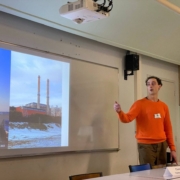Clarence holds a joint PhD in urban studies and history from the Institut national de la recherche scientifique and Sorbonne Université. His thesis looked at the social and material consequences of urban energy transitions in Montréal between 1945 and 1980. It studied topics like wood and coal yards, gas stations, oil refineries, energy demand forecasts, and urban heating. He also completed a master’s in science and technology studies at York University in Toronto. He is currently a SSHRC-funded postdoctoral researcher at Université Paris 1 Panthéon Sorbonne. His current work looks at the social, urban, and environmental causes and consequences of deindustrialization in Western cities. It does so through an investigation of the contrasted historical trajectories of waste incinerators in Montréal, Canada, and Paris, France. He is also interested in social and political conflicts around the reuse of urban and suburban brownfields.
Project statement:
Heavy industry in changing urban contexts: conflicts around waste incinerators in Montréal and Paris
This project looks at the evolution of the relationship between industry and other urban functions in dense urban contexts. Whereas industrial cities were marked by an intense cohabitation and proximity between factories, workers, and homes, deindustrializing urban settings bring about tensions between different uses of the city and changing social fabrics around industrial sites. To study this dynamic, this project compares Montréal and Paris’ ways of treating municipal waste. Montréal burned its waste in incinerators until the 1990s, when social movements and economic constraint led to their closure. Despite political and financial pressure, Paris and its near suburbs still use three large incinerators to treat their waste. By investigating the reasons why these two cities’ waste treatment trajectories diverged, this project insists on the role of social and urban change in deindustrialization processes and on the importance of energy, politics, and architecture in understanding waste treatment trajectories.





